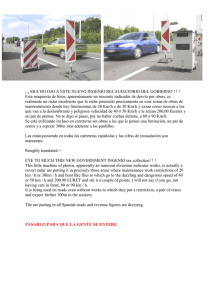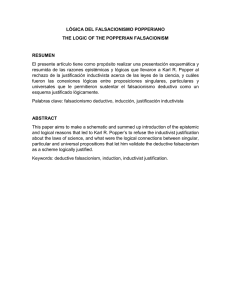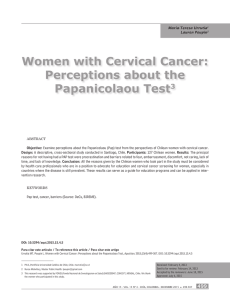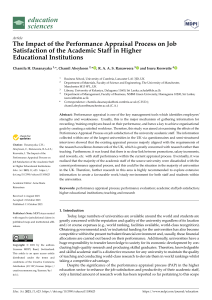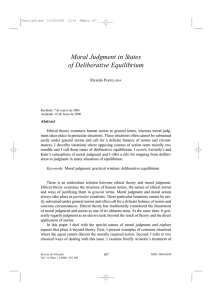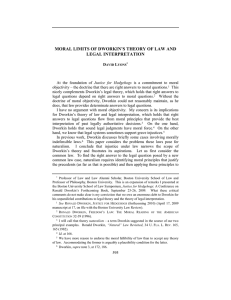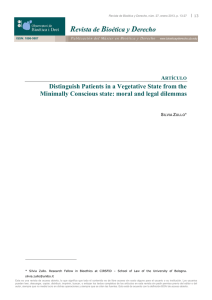El regreso de la relatividad lingüística Juan José Acero Universidad
Anuncio
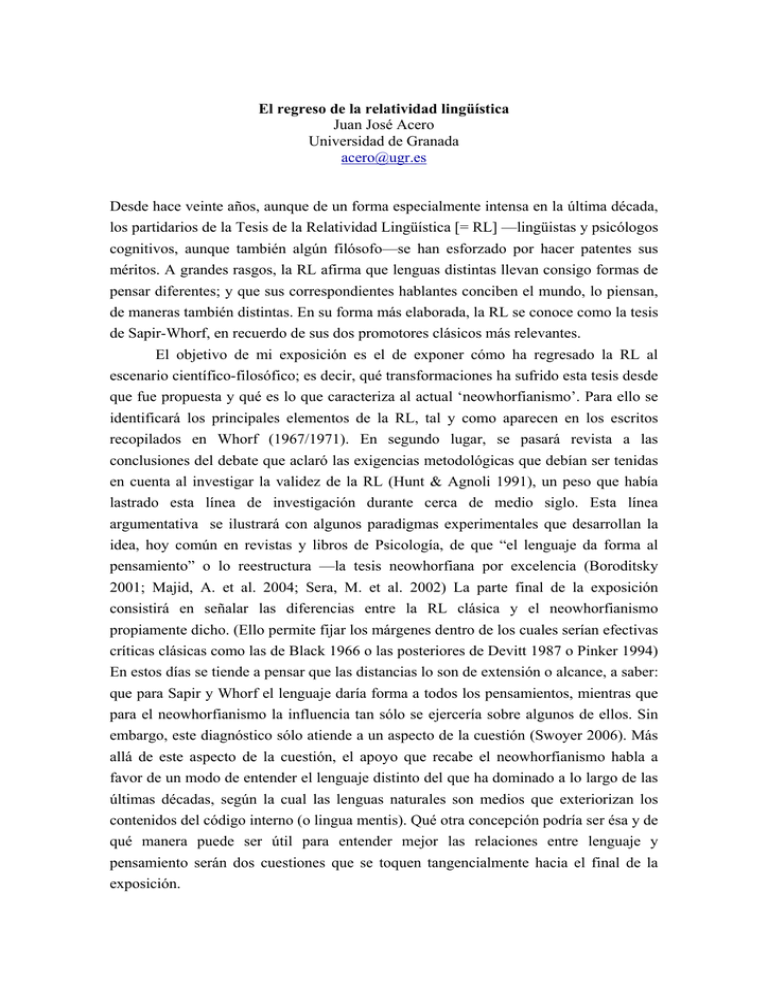
El regreso de la relatividad lingüística Juan José Acero Universidad de Granada [email protected] Desde hace veinte años, aunque de un forma especialmente intensa en la última década, los partidarios de la Tesis de la Relatividad Lingüística [= RL] —lingüistas y psicólogos cognitivos, aunque también algún filósofo—se han esforzado por hacer patentes sus méritos. A grandes rasgos, la RL afirma que lenguas distintas llevan consigo formas de pensar diferentes; y que sus correspondientes hablantes conciben el mundo, lo piensan, de maneras también distintas. En su forma más elaborada, la RL se conoce como la tesis de Sapir-Whorf, en recuerdo de sus dos promotores clásicos más relevantes. El objetivo de mi exposición es el de exponer cómo ha regresado la RL al escenario científico-filosófico; es decir, qué transformaciones ha sufrido esta tesis desde que fue propuesta y qué es lo que caracteriza al actual ‘neowhorfianismo’. Para ello se identificará los principales elementos de la RL, tal y como aparecen en los escritos recopilados en Whorf (1967/1971). En segundo lugar, se pasará revista a las conclusiones del debate que aclaró las exigencias metodológicas que debían ser tenidas en cuenta al investigar la validez de la RL (Hunt & Agnoli 1991), un peso que había lastrado esta línea de investigación durante cerca de medio siglo. Esta línea argumentativa se ilustrará con algunos paradigmas experimentales que desarrollan la idea, hoy común en revistas y libros de Psicología, de que “el lenguaje da forma al pensamiento” o lo reestructura —la tesis neowhorfiana por excelencia (Boroditsky 2001; Majid, A. et al. 2004; Sera, M. et al. 2002) La parte final de la exposición consistirá en señalar las diferencias entre la RL clásica y el neowhorfianismo propiamente dicho. (Ello permite fijar los márgenes dentro de los cuales serían efectivas críticas clásicas como las de Black 1966 o las posteriores de Devitt 1987 o Pinker 1994) En estos días se tiende a pensar que las distancias lo son de extensión o alcance, a saber: que para Sapir y Whorf el lenguaje daría forma a todos los pensamientos, mientras que para el neowhorfianismo la influencia tan sólo se ejercería sobre algunos de ellos. Sin embargo, este diagnóstico sólo atiende a un aspecto de la cuestión (Swoyer 2006). Más allá de este aspecto de la cuestión, el apoyo que recabe el neowhorfianismo habla a favor de un modo de entender el lenguaje distinto del que ha dominado a lo largo de las últimas décadas, según la cual las lenguas naturales son medios que exteriorizan los contenidos del código interno (o lingua mentis). Qué otra concepción podría ser ésa y de qué manera puede ser útil para entender mejor las relaciones entre lenguaje y pensamiento serán dos cuestiones que se toquen tangencialmente hacia el final de la exposición. REFERENCIAS Black, M. (1966). “La relatividad lingüística: las opiniones de Benjamin Lee Whorf”. En Modelos y metáforas. Madrid. Tecnos. Boroditsky, L. (2001). “Does Language Shape Thought? Mandarin and English Speakers’ Conception of Time”. Cognitive Psychology. 43, 1-22. Devit, M. (1987). Language and Reality. Oxford. Basil Blackwell. Hunt, E. & Agnoli, F. (1991). “The Whorfian Hypothesis: A Cognitive Psychology Perspective”. Psychological Review. 98/3, 377-389. Majid, A. (2004). “Can Language Restructure Cognition? The Case for Space. Trends in Cogntive Science. 8/3, 108-114. Pinker, S. (1994). The Language Instinct. London. Penguin Books. Sera, M. et al. (2003). “When Language Affects Cognitition and When It Does Not: An Analysis of Grammatical Gender and Classification”. Journal of Experimental Psychology: General. 131/3, 377-397. Swoyer, C. (2006). “The Linguistic Relativity Hypothesis (Supplement to Relativism)”. http://plato.stanford.edu/entries/ relativism/ suplement2.html Whorf, B. L. (1957/1971). Language, Thought and Reality. Cambridge, MA: The M.I.T. Press. (Versión castellana en Barral Editores, de Barcelona, en 1971.) The Singularity of Singular Thought Tim Crane University of Cambridge In Word and Object Quine describes a singular term as one that ‘purports to refer to just one object’. The dictionary defines ‘to purport’ as ‘to appear or claim to be or do something, especially falsely’. So a singular term can appear to refer to just one object, even if it does not so refer. It is widely agreed that just as there are singular terms, there are singular thoughts. A singular thought, then, is a thought that purports to refer to some particular object. But can a singular thought purport to be about a particular object even when there is no such object? The orthodox view of singular thought says not: singular thoughts are object-dependent, they depend for their existence or availability for thought on the existence of the object they are about. In this paper I dispute this orthodoxy. I argue that if we start from the psychological basis of singular thought, then thoughts about the non-existent can be just as singular as thoughts about existent objects. Singular thoughts can merely purport to refer to just one object. Constructing a world for the senses Katalin Farkas Central European University, Budapest How do we form a manifest image of the world based on the experiences we receive through the senses? I shall present the beginnings of an answer by looking at some aspects of the functioning of the somatosensory system. There are three kinds of receptors in the skin: mechanoreceptors, thermoreceptors and nociceptors. The three receptors are sensitive to three different kinds of stimuli, and when activated, give rise to three different kinds of experiences. Hence sometimes physiologists would talk of a pressure-sense, a warm-andcold sense and a pain-sense. But certain philosophers objected to this way of talking, pointing out that while experiences of pressure and warm-and-cold indeed provide perceptions of the external world, pain experiences don't. My question is: what explains this difference? And can we conceive circumstances in which feeling pain becomes a form of exteroceptive perception? The answers to these questions provide the outline for a general theory of how we construct an image of the world through the senses. Blame, Moral Obligation and Alternative Possibilities Carlos J. Moya Universidad de Valencia ([email protected]) The Principle of Alternative Possibilities (PAP) can be stated thus: “A person is morally responsible for something she has done only if she was able to do otherwise”. For the last forty years or so this principle has been the object of a long and intricate discussion. According to some thinkers, PAP is false. Others contend that it is true. These are the two main positions about this important issue. There are, however, a minority of philosophers who hold an asymmetrical view according to which PAP is true for blameworthy actions, but false for praiseworthy ones. In this paper, and unlike what I used to think, I side with this minority position and defend an asymmetrical view of this kind. My proposal is that we can best understand this asymmetry by going through the concept of moral obligation, of what people should or should not do or have done. In our folk conceptual frame, I contend, moral responsibility (MR) is related to alternative possibilities (APs), to freedom to do otherwise, through the mediating notion of moral obligation. In assessing MR in particular cases, our primary concern is not whether the agent could have done otherwise, but whether she should or should not have done what she did. And I argue that the question whether the agent could have done otherwise is normally raised only when we judge that the agent should not have acted as she did, but not when we judge that she has behaved as she ought to. In order to reinforce the view that APs are not required for being praiseworthy for morally good and admirable actions, I examine what I called “Luther” cases, owing to Luther’s famous statement, “Here I stand; I can do no other”. In this context, I refer to an old moral principle, namely, that ‘ought’ implies ‘can’ (OIC) and examine its relations to PAP. In the light of our proposal, we can understand why PAP can be derived from OIC for blameworthy actions, but not for praiseworthy ones. In order to show that APs are instead required for blameworthiness, we go on to examine Frankfurt cases. These cases raise a strong intuition to the effect that agents are fully morally blameworthy for something they do even if, owing to the lurking but ineffective presence of a certain factor, they could not have done otherwise. If this intuition is true, then PAP is false. A way of resisting this conclusion is to hold that some APs remain in these cases. However, not any AP goes. In order to sustain PAP against Frankfurt cases, to use Fischer’s terms, APs have to be robust in the sense of being explanatorily relevant to an agent’s MR. Now, in the context of our proposal, when we explain an agent’s blameworthiness by appealing to things she could have done but did not, we are presupposing that these are things that she should have done but did not. In our view, then, robust, morally significant APs are unfulfilled moral duties. Irrelevant APs, mere “flickers”, to use Fischer’s term again, are so because they are not things that the agent should have done. Our account can give, then, a principled justification of the requirement of robustness and moral significance for those APs that, in Frankfurt cases, can be adverted to in order to defend PAP. 1 On our proposal, a primary question concerning Frankfurt cases would be: “Did the agent do what she should, morally speaking?” If the answer is negative; then there seem to be unfulfilled moral duties, things that the agent should have done but did not. In such a case, the question whether she could (was able to) have done those things becomes crucial. If she could, then she had within her reach robust, even exempting, APs, unfulfilled moral duties such that, had she fulfilled them, her blame would have decreased or even disappeared. Suppose, however, that the agent could not have done the things she should have done. In this case, given OIC, there were no unfulfilled moral duties after all and the agent is not blameworthy, for there was nothing that she should have done but did not. PAP remains unscathed. Frankfurt theorists will object to the preceding considerations that adverting to OIC is sort of question begging against them. Our suggestion at this point is to resort to a new principle, drawn from common sense wisdom, which has some connections with OIC but is different from it. We call this principle “DEC” (from “doing everything one can”): (DEC) If someone does everything she can reasonably do in order to fulfil her moral duties, she is not obliged to do more, and so is not morally blameworthy for not doing more. By reflecting on some examples, including Frankfurt cases, in the light of DEC, we can see that which kinds of actions are fully robust APs is a contextual matter, and depends importantly on the effective extension, in the particular situation an agent is, of her power or ability to fulfil her moral obligations. On this basis, we argue that even highly sophisticated Frankfurt cases do not show that blameworthiness does not require APs and PAP, concerning blameworthiness, remains safe, 2



